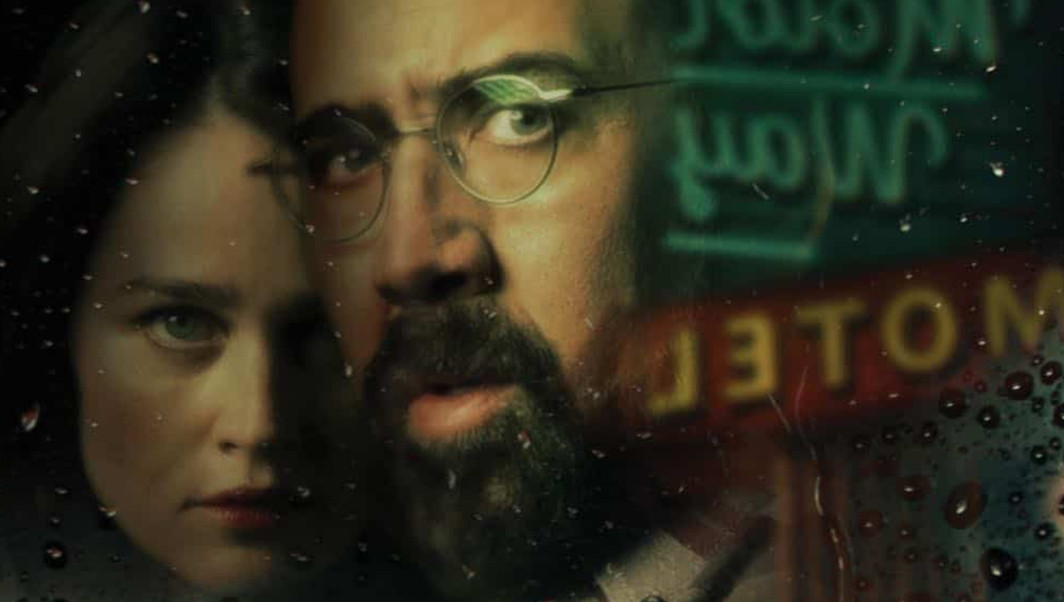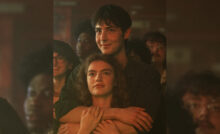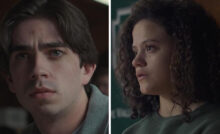Pop Culturalist Chats with Looking Glass’ Tim Hunter


Tim Hunter’s been in the business for a long time. His directing career spans more than three decades and he has had experience directing hundreds of actors and actresses. Tim also had a hand through the years directing episodes of wildly popular and critically acclaimed shows such as 90210, Twin Peaks, Riverdale, Breaking Bad, Gotham, and Glee.
His most recent project is the movie Looking Glass, starring Nicolas Cage, Robin Tunney, and Marc Blucas. Cage and Tunney play a couple who buy a quaint desert motel in the middle of nowhere, but things turn south when a motel guest ends up dead and reveals the previous owner’s dark secret.
We had so much fun chatting with Tim and getting a peek behind the director’s curtain.
PC: Tell us about Looking Glass and how you got involved with this project.
Tim: The producer sent the script to me with Nicolas Cage already attached. It was in the neo-noir murder/mystery genre, which I love, and I was looking to get back into features after years of mostly doing television. What I liked about it was that it was about a conflicted man and couple. He wants to be faithful to his wife and stay in their marriage even though he’s transgressed. He’s drinking too much, taking pills, and their daughter fell off the balcony and died. So, they’re in a precarious place. Trying to start a new life which is always a good place to start a picture I think. Despite his best intentions there, there’s an unresolved need inside of him and that’s where the sex, murder-mystery voyeurism story in the plot played to.
PC: You mentioned that you directed a lot of TV. What are some of the major differences between shooting a TV show verses shooting a full-length feature film?
Tim: TV is a producers’ and writers’ medium more than a directors’. You know, obviously there are exceptions, but a freelance director like me comes in as a hired gun. What’s both challenging about it, and what I like about it, is that I go from show to show and I meet a whole bunch of people: new cast, new crew, etc. You also learn what the producer thinks the look of the show should be—the style—and I feel like I get to be a chameleon when it comes to that. In TV, you’re shooting a 50-55 page script in often seven or eight days. A feature is more under the control of a director and less putative in terms of the schedule. You can explore the performances with the actors a lot longer, you can get extra set-up time, include more of the world around them, and add more texture.
PC: You mentioned Nicolas Cage, and you’ve worked with a lot of actors in your career. What did you learn about the working styles of Nicolas, Robin, and Marc in this movie?
Tim: I’ve worked with Robin in the past and we always chatted about collaborating on another project together. The same with Marc, who I’ve done two shows with—Necessary Rough and Underground—so I thought of him for the part because I knew what he could do. I’ve never worked with Nicolas Cage, though, and as you know, he does several pictures in any given year, so one wonders how he’s able to relate to any individual picture because he goes from one to another, but boy, he just showed up and knew the script of Cole, thought the character through, and knew exactly what he wanted to do. I identified just a few key scenes where I thought maybe we could get a little more emotion and background for the audience out of them and he was receptive to that as long as he understood the goals that we were reaching for. He just was a total pro and completely committed to it. All the other actors were dying to work with Nicolas and loved working with him. He just brought everybody’s game up by just being so clearly committed to it. It’s wonderful, and I guess he’s like that with all these pictures—he’s great in all of them.
PC: If you had to pick one scene from Looking Glass that you are excited for audiences to see what would it be and why?
Tim: Some of my favorite scenes in the film are when Nicolas Cage’s character is looking out the blinds from his back office into the parking lot, watching people come and go, and trying to figure out what’s going on. To me, there’s this sort of metaphor of seeing everything and seeing nothing at the same time in those scenes, and plus they’re some of the most Hitchcockian scenes because they deal with a very straightforward point-of-view going back and forth between the watcher and what he’s watching.
Check out Looking Glass in theaters now and on VOD.
Recent Posts
SXSW 2025: Florence Hunt and Rory Walton-Smith on ‘Mix Tape,’ First Love, and Their Artistic Process
First love is unforgettable. It leaves an imprint, shaping the way we see the world,…
SXSW 2025: Why ‘F*ckUps Anonymous’ Is More Than Just a Show—Joe Tierney, Katrina Whalen, Sarah Jeffery & Andrew Michael Fama on Giving a Voice to the Voiceless and the Power of Storytelling
Television has the power to do more than entertain—it can challenge, heal, and transform. Some…
SXSW 2025: Siobhan McCarthy, Misha Osherovich, and Nico Carney on Reclaiming Comedy Classics with Trans Inclusion in ‘She’s the He’
Comedy classics like Mean Girls, She’s the Man, and Clueless have shaped generations with their…
Daring, Unpredictable, and Unforgettable: Tyler Cornack’s ‘Mermaid’ Dives into SXSW 2025 with Stars Johnny Pemberton and Avery Potemri
To say Tyler Cornack is a visionary would be an understatement. His fearless approach to…
SXSW 2025: Daisy Friedman and Arielle Friedman on ‘Unholy,’ Authentic Representation, and Capturing the Pressures of Family, Tradition, and Identity
There’s nothing more powerful than a filmmaker reclaiming their own story, but true brilliance comes…
Inside ‘Sweetness’: How Writer-Director Emma Higgins and Her Cast Built One of SXSW’s Most Unforgettable Films
Sweetness isn’t just a film—it’s a layered, unsettling portrait of fame, grief, fixation, and the…

